Locksmiths work in locksmith shops where they cut keys; sell new locks to customers; and install, repair, and replace locks. Some locksmiths may work with electronic security systems, traveling to the work site to install locks and security systems. In addition, some may specialize in vehicle locksmithing or installing and servicing safes and vaults used in banks.
Job Related Skills, Interests and Values
- Cutting keys and serving customers by answering questions and advising clients on products
- Repairing, installing, and adjusting locks, as well as changing lock combinations
- Using a variety of hand tools including metal saws, files, and welding and soldering equipment
- Working on residential, automotive, commercial, and institutional locksets
- Installing, programming, and repairing electronic locks and working with high security locks
- Using special tools to determine combination or drill into damaged bank safes or vaults
- Working alone in a position of trust, without much supervision to get the job done
What Preparation and Training Do You Need?
- Secondary school diploma; math, English, and science credits are assets
- Training in welding, electronics, carpentry, and metalworking would be beneficial
- While not mandatory, completion of a 6,000-hour apprenticeship, including a combination of on-the-job and in-school training, is recommended
What's Your Future as a Locksmith (259L)?
- Generally 40-hour week; possibility of on-call, evenings, or weekends
- Work could be in well-lit shops in plazas or malls, or small, crowded shops/mobile units
- May work in awkward/confined spaces or work/travel in adverse weather conditions
- Keeping up with new technology important
- Employers include security firms, locksmith companies, car dealerships, hardware stores
Wage Rate
Apprentice wage increases with skill and experience. Fully qualified workers earn an average of $25.63-$43.50 per hour.
Self-Rating
Locksmith (259L)
| Ask Yourself: | Yes | No |
|---|---|---|
| Do you have good hand-eye coordination? | ||
| Are you able to work indoors and outdoors? Are you comfortable working at all heights? | ||
| Do you enjoy working with different hand tools? | ||
| Are you able to follow Health & Safety guidelines? | ||
| Do you enjoy solving puzzles and problems? | ||
| Do you have a driver’s license? Do you have a clean criminal record? | ||
| Are you reliable, a self-starter and able to work with minimal supervision? Are you interested in travelling for work? |
If you checked YES to the majority of these questions, a career as a Locksmith (259L) may be for you!
You might want to look at these similar trades as well;
- Machinist
- Facilities Maintenance Technician
- Security Systems Technician
- Saw Filer/Fitter
Electronics Service Technicians specialize in repairing electronic equipment such as radio and television receivers, stereo components, video cameras, video and audio tape recorders, two-way radio communication systems, and bio-medical systems.
Saw Filer/Fitters repair, set, and sharpen blades for band, chain, hand, circular, and other types of saws.
General Machinists are skilled craftspeople who set up and operate precision metal cutting and grinding machines including lathes, milling machines, drills, shapers, boring mills, and grinders. They may use equipment to manufacture, install, operate, adjust, and repair machine tools and other machines in common use.
Motive Power Machinists are skilled craftspeople that set up and operate precision metal cutting and grinding machines including lathes, milling machines, drills, shapers, boring mills and grinders. They may use this equipment to manufacture, install, operate, disassemble, re-condition, adjust, repair, or replace motor vehicle parts including engines, suspensions, flywheels, brake components, blocks, cylinder heads, crankshafts, and connecting rods.
